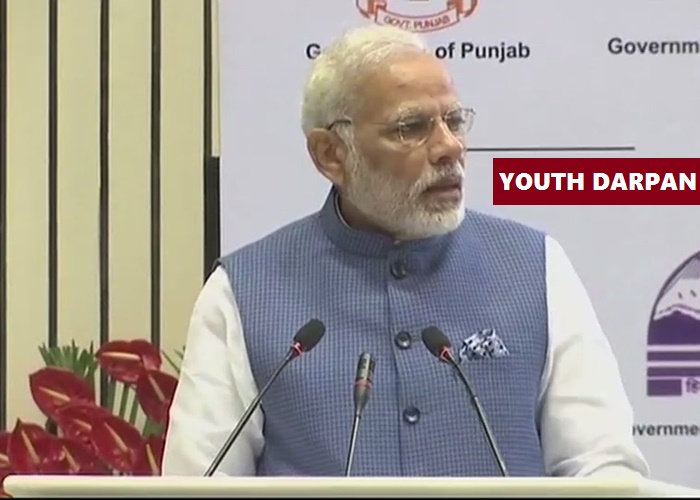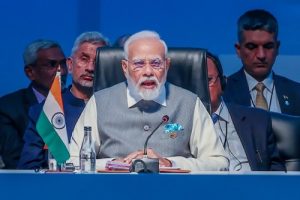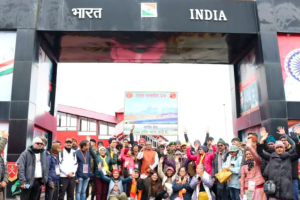Excellencies,
Captains of Business and Industry,
Ladies & Gentlemen,
I am happy to be a part of this august gathering of global leaders and decision makers of the food processing sector. I welcome you all to World Food India 2017.
This event will provide you a glimpse of the opportunities that await you, in India. It will showcase our potential in the food processing value chain. It will provide a platform to connect with various stakeholders, and collaborate for mutual prosperity. And, it will present to you, some of our most delightful cuisine, which has stimulated taste buds across the world.
Ladies and gentlemen.
India’s strengths in agriculture, are many and diverse. The second largest arable land area, and as many as 127 diverse agro-climatic zones, give us global leadership in a number of crops like bananas, mangoes, guavas, papayas, and okra. We are second, globally, in terms of production of rice, wheat, fish, fruits and vegetables. India is also the world’s biggest milk producer. Our horticulture sector has shown an average growth rate of 5.5 per cent annually over the last ten years.
For centuries, India has welcomed traders from distant lands, who came in search of our distinctive spices. Their travels to India, often shaped the course of history. Our trade synergies with Europe and South East Asia through the Spice Route are well known. Even Christopher Columbus was attracted to Indian spices, and reached America, as he searched for an alternate sea route to India.
Food processing is a way of life in India. It has been practiced for ages, even in the humblest of households. Simple, home-based techniques, such as fermentation, have resulted in the creation of our famous pickles, papads, chutneys and murabbas that now excite both the elite and the masses, across the world.
Ladies and gentlemen.
Let us turn, for a while, to the big picture.
India is today one of the fastest growing economies of the world. The Goods and Services Tax, or GST, has eliminated the multiplicity of taxes. India has jumped thirty ranks this year, in the World Bank Doing Business rankings. This is the highest ever improvement for India, and the highest jump for any country this year. From a rank of 142 in 2014, we have now reached the top 100.
India was ranked number one in the world in 2016 in greenfield investment. India is also rapidly progressing on the Global Innovation Index, Global Logistics Index and Global Competitiveness Index.
Starting a new business in India is now easier than ever before. Procedures for obtaining clearances from various agencies have been simplified. Archaic laws have been repealed, and the burden of compliances has been reduced.
I now turn specifically, to food processing.
The Government has undertaken a range of transformational initiatives. India is now the most preferred investment destination in this sector. It is a priority sector in our “Make in India” programme. 100% FDI, is now permitted, for trading, including through e-commerce, of food products manufactured or produced in India. A single-window facilitation cell provides handholding for foreign investors. There are attractive fiscal incentives from the Union and State Governments. Loans to food and agro-based processing units, and cold chains, are classified under priority sector lending, making them easier and cheaper to obtain.
The unique portal – Nivesh Bandhu – or “investor’s friend” – that we have just launched, brings together information on central and state government policies, and incentives provided for the food-processing sector. It maps resources upto the local level, with processing requirements. It is also a platform for business networking, for farmers, processors, traders, and logistics operators.
Friends.
Private sector participation has been increasing in many segments of the value chain. However, more investment is required in contract farming, raw material sourcing and creating agri linkages. Many international companies in India have taken a lead in contract farming initiatives. This is a clear opportunity for global super-market chains considering India as a major outsourcing hub.
On one hand, there are opportunities in post-harvest management, like primary processing and storage, preservation infrastructure, cold chain, and refrigerated transportation. On the other hand, there is immense potential for food processing and value addition, especially in niche areas such as organic and fortified foods.
Increasing urbanization, and a growing middle class, are resulting in an ever-growing demand for wholesome, processed food. Let me share just one statistic. Over a million passengers have a meal on a train in India, every single day. Each one of them, is a potential customer for the food processing industry. Such is the scale of opportunity that is waiting to be tapped.
Ladies and Gentlemen.
Lifestyle disease is raising consciousness globally, about the nature and quality of food consumption. There is a growing aversion to the use of artificial colours, chemicals and preservatives. India can provide solutions, and offer a win-win partnership.
The combination of traditional Indian food, with modern technology, processing and packaging, can help the world rediscover the health benefits, and refreshing taste of Indian food ingredients such as turmeric, ginger, and tulsi, to name just a few. The perfect blend of hygienic, nutritious and tasty processed food, with the added benefits of preventive healthcare, can be produced economically, here in India.
The Food Safety and Standards Authority of India has been engaged in ensuring that processed food made in India, matches global quality standards. The harmonization of the food additives standards with Codex, and the building of robust testing and laboratory infrastructure, will go a long way in creating an enabling environment for food businesses.
Ladies and gentlemen.
The farmers, whom we respectfully call our “Annadaata” or the providers of food are central to our efforts in food processing. We have a stated target of doubling farm incomes within five years. Recently, we launched a national level programme, the Pradhan Mantri Kisan Sampada Yojana, to create world-class food processing infrastructure. This is expected to leverage investment of five billion US dollars, benefit two million farmers and generate more than half a million jobs over the next three years.
The creation of Mega Food Parks is a key component of this scheme. Through these food parks, we aim to link agro-processing clusters with key production centres. This will offer immense value proposition in crops such as potato, pineapple, oranges and apples. Farmer groups are being encouraged to set up units in these parks, thereby reducing wastage and transportation costs, and creating new jobs. Nine such parks are already operational, and more than thirty others are in the process of coming up across the country.
To improve last mile delivery, we are improving governance, by increasing access to digital technology. We plan to link our villages through broadband connectivity, within a clear timeframe. We are digitising land records, and providing various services to the people on mobile platforms. These steps are building momentum towards real-time transfer of information, knowledge and skills to farmers. The e-NAM, our national agricultural e-Market, is connecting our agricultural markets nationwide, thereby giving our farmers the benefit of competitive pricing, and freedom of choice.
In the true spirit of cooperative and competitive federalism, our State Governments have also aligned with the efforts of the Union Government to simplify processes and procedures. Many States have come up with attractive food processing policies to attract investment. I urge each State of India to identify at least one food product for specialisation. Similarly, each district can also select some food items for production, and one item for specialisation.
Ladies and Gentlemen.
Today, our strong agricultural base provides us a solid launch pad to create a vibrant food processing sector. Our vast consumer base, rising incomes, favourable investment climate and a Government dedicated to ease of doing business, all make India ‘the place to be’ for the global food processing fraternity.
Each sub sector of the food industry in India offers immense opportunity. Let me give you some illustrations.
The dairy sector has emerged as a vital area for the rural economy. We now aim to take this to the next level by increasing production levels of multiple products based on milk.
Honey is nature’s gift to mankind. It offers several valuable by-products, such as bee wax. It has the potential to increase farm incomes. Currently, we rank sixth in the production and export of honey. India is now ripe, for a sweet revolution.
India contributes over six per cent of global fish production. We are the world’s second largest exporter of shrimps. India exports fish and fisheries products to about 95 countries. We aim to make a big leap in the ocean economy through the blue revolution. Our focus is on development of untapped areas, such as ornamental fisheries and trout farming. We also wish to explore new areas, like pearl farming.
Our commitment to sustainable development, is at the heart of our thrust for organic farming. Sikkim, in north-eastern India, has become India’s first fully organic state. The entire north-east offers opportunities to create functional infrastructure for organic produce.
Friends.
In order to be successful in Indian markets, understanding Indian food habits and tastes is a key requirement. To give you just one example, milk based products and fruit-juice based drinks are an intrinsic part of Indian food habits. That is why, I have been suggesting to manufacturers of aerated drinks, the potential of blending five per cent fruit juice in their products.
Food processing also holds solutions to nutrition security. For example, our coarse grains and millets have high nutritional value. They can also withstand adverse agro-climatic conditions. They can be called “nutrition rich and climate smart” crops. Can we take up a venture based on these? This will raise incomes of some of the poorest of our farmers, and also enhance our nutrition levels. Such products, shall, of course, find resonance across the world.
Can we link our potential, to the world’s requirements? Can we link Indian traditions with the future of mankind? Can we connect India’s farmers with markets around the world? These are some questions that I wish to leave you with.
I am confident that World Food India will help us take some concrete steps in this direction. It will also provide valuable insights into our rich culinary landscape, and highlight our ancient wisdom of food processing.
I am also happy to note that the Department of Post has released a set of twenty four commemorative postage stamps on this occasion, to illustrate the diversity of Indian cuisine.
Ladies and Gentlemen,
I invite each one of you to become a part of the exciting growth journey of India’s food processing sector. I assure you of my whole-hearted support, whenever required.
Come. Invest in India.
The place with unlimited opportunity from farm to fork.
The place to produce, process, and prosper.
For India, and for the world.
Thank You.
























